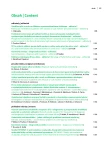-
Medical journals
- Career
Medicine at a polar station in Antarctica
Authors: doc. MUDr. Kristián Brat, Ph.D. 1; Ondřej Zvěřina 2
Authors‘ workplace: Klinika nemocí plicních a tuberkulózy LF MU a FN Brno, pracoviště Bohunice, přednostka prof. MUDr. Jana Skřičková, CSc. 1; Ústav ochrany a podpory zdraví LF MU Brno, přednostka prof. MUDr. et Bc. Zuzana Derflerová Brázdová, DrSc. 2
Published in: Vnitř Lék 2015; 61(12): 1093-1097
Category: Various
Overview
The paper describes specific aspects of work of a scientific expedition doctor and the stay and life at a polar research station in Antarctica. Apart from the outline of everyday problems, the first named author also learns about the history of medical practitioners working in Antarctica, writes about the results of the biomedical research activities conducted in the period of 2011–2014 and briefly describes the daily routine at a scientific polar station in Antarctica.
Key words:
Antarctica – a medical practitioner‘s work at a polar station
Sources
1. Reed HL, Silverman ED, Shakir KM et al. Changes in serum triiodothyronine (T3) kinetics after prolonged Antarctic residence: the polar T3 syndrome. J Clin Endocrinol Metab 1990; 70(4): 965–974.
2. Palinkas LA, Suedfeld P. Psychological effects of polar expeditions. Lancet 2008; 371(9607): 153–163.
3. Panin LE. Human homeostasis in high-latitude environment. Alaska Med 2007; 49(2 Suppl): 25–28.
4. Arendt J. Biological rhythms during residence in polar regions. Chronobiol Int 2012; 29(4): 379–394.
5. Fares A. Winter Hypertension: Potential mechanisms. Int J Health Sci (Qassim) 2013; 7(2): 210–219.
6. Davídkovová H, Plavcová E, Kynčl J et al. Impacts of hot and cold spells differ for acute and chronic ischaemic heart diseases. BMC Public Health 2014; 14 : 480.Dostupné z DOI: <http://dx.doi.org/10.1186/1471–2458–14–480>.
7. Gasparrini A, Guo Y, Hashizume M et al. Mortality risk attributable to high and low ambient temperature: a multicountry observational study. Lancet 2015; 386(9991): 369–375.
8. Adámek H. Češi v Antarktidě. Freytag & Berndt: Praha: 2010 : 60–62. ISBN 9788086236230.
9. Reason J, Brand JJ. Motion Sickness. Academic Press: London: 1975. ISBN 978–0125840507.
10. Schmäl F. Neuronal mechanisms and the treatment of motion sickness. Pharmacology 2013; 91(3–4): 229–241.
11. Brat K, Homolka P, Cornelissen G et al. Chronobiological changes in arterial blood pressure in participants of the 5th and 6th Czech Antarctic Scientific Expeditions. Neuro Endocrinol Lett 2015; 36(1): 80–83.
12. Halberg F, Powell D, Otsuka K et al. Diagnosing vascular variability anomalies, not only MESOR-hypertension. Am J Physiol Heart Circ Physiol 2013; 305(3): H279-H294.
13. Otsuka K, Cornelissen G, Halberg F et al. Excessive circadian amplitude of blood pressure increases risk of ischaemic stroke and nephropathy. J Med Eng Technol 1997; 21(1): 23–30.
14. Scherr J, Braun S, Schuster T et al. 72-h kinetics of high-sensitive troponin T and inflammatory markers after marathon. Med Sci Sports Exerc 2011; 43(10): 1819–1827.
15. Shave R, Baggish A, George K et al. Exercise-induced cardiac troponin elevation: evidence, mechanisms and implications. J Am Coll Cardiol 2010; 56(3): 169–176.
16. Eijsvogels T, George K, Shave R et al. Effect of prolonged walking on cardiac troponin levels. Am J Cardiol 2010; 105(2): 267–272.
17. Lippi G, Cervellin G, Banfi G et al. Cardiac troponins and physical exercise. It´s time to make a point. Biochem Med 2011; 21(1): 55–62.
18. Harper RW. Exercise-induced troponin elevation: not necessarily a benign phenomenon. J Am Coll Cardiol 2010; 56(25): 2145.
19. Dawson EA, Whyte GP, Black MA et al. Changes in vascular and cardiac function after prolonged strenuous exercise in humans. J Appl Physiol 2008; 105(5): 1562–1568.
20. Brat K, Merta Z, Sevcik P. Effects of medium-level physical performance on blood levels of cardiac biomarkers in extreme conditions of Antarctica. Czech Polar Reports 2014; 4(1): 9–16.
Labels
Diabetology Endocrinology Internal medicine
Article was published inInternal Medicine

2015 Issue 12-
All articles in this issue
- Regional registry of pulmonary embolism
- Antithrombotic therapy and nonvariceal upper gastrointestinal bleeding
- Ventilatory function in patients with silicosis or coal workers’ pneumoconiosis
- Lenalidomide treatment in myelodysplastic syndrome with 5q deletion – Czech MDS group experience
- Investigation of tubular reabsorption of phosphates in patients with chronic kidney disease
- Role of soluble receptor ST2 measurment in diagnosis and prognostic stratification in patients with heart failure
- Geriatric multimorbidity – one of the key problem of contemporary medicine
- Carotid stenosis – diagnosis and treatment
-
PATHWAY-2 Study: spironolactone vs placebo, bisoprolol and doxazosin to determine optimal treatment of resistant hypertension.
Spironolactone high effective in lowering blood pressure in drug resistant hypertension - Monoclonal immunoglobulin (M-Ig) and skin diseases from the group of mucinoses – scleredema adultorum Buschke and scleromyxedema. Description of four cases and an overview of therapies
- Uncorrected Tetralogy of Fallot – a case report of a 69-year-old patient
- Medicine at a polar station in Antarctica
- Internal Medicine
- Journal archive
- Current issue
- Online only
- About the journal
Most read in this issue- Carotid stenosis – diagnosis and treatment
- Geriatric multimorbidity – one of the key problem of contemporary medicine
- Investigation of tubular reabsorption of phosphates in patients with chronic kidney disease
- Ventilatory function in patients with silicosis or coal workers’ pneumoconiosis
Login#ADS_BOTTOM_SCRIPTS#Forgotten passwordEnter the email address that you registered with. We will send you instructions on how to set a new password.
- Career

